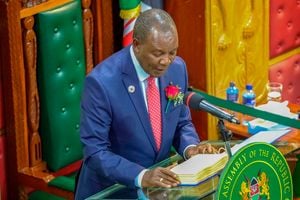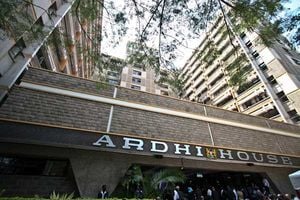
National Assembly Lands Committee Chairman Joash Nyamoko and his deputy Jayne Kihara during a fact-finding mission in Eldoret on 7 June 2024.
A proposed law change to require owners of freehold land within or close to an urban area to pay an annual land levy in addition to land rates is among the grievances fuelling the ongoing protests.
The proposed levy on freehold land has been criticised by even the National Lands Commission (NLC) as amounting to double taxation.
Among those who will feel the pain of the additional levy are homeowners on ancestral land on the fringes of the city like Dagoretti in Nairobi and towns in Kiambu.
Although imposed under the Land Laws (Amendment) (No.2) Bill of 2023, which is before the National Assembly, mounting criticism of the levy has coincided with anti-tax protests, giving the impression it’s detailed in the controversial Finance Bill.
The Bill seeking to amend the Land Act, 2012, by inserting the new levy after section 54, is being rushed through the National Assembly.
It proposed that the Land Act 2012 be amended by inserting a new section immediately after section 54.
The proposed new section 54A reads: “The owner of any freehold land situated within the boundaries of any urban area or city shall pay an annual land levy equivalent to land rent charged on a comparable leasehold land or property of the same size in the same zone; provided that any owner of freehold land that is put to agricultural use may be exempt from the annual land levy.”
Public participation
On Monday, June 24, the chairman of the Lands committee in the National Assembly Mr Joash Nyamoko explained his team has gone slow on processing the Bill.
Mr Nyamoko said his committee, after public participation, resolved there was so much confusion in the country's land tenure system, including revelations some land had been controversially converted from leasehold to freehold tenures.
"Land is very emotive. We realised we needed to first clean up the land tenure system before processing the Bill because of its far-reaching recommendations," Mr Nyamoko told Nation.Africa.
The new Bill is sponsored by Majority Leader Kimani Ichung'wah who withdrew a proposed law with similar provisions this year.
Speaker Moses Wetang’ula communicated the withdrawal of the previous Bill to the House on April 19 but the current Bill still has a similar levy on freehold land.
It is understood some MPs including members of the committee are also not comfortable with the new levy as they, too, are owners of freehold land.
Mr Nyamoko said the committee will not approve provisions that are against public interest.
Last December, MPs resolved to shorten the Bill’s publication period from 14 days to one day to allow its prompt introduction in the House.
The Bill’s publication period was shortened alongside another controversial legislation, the Affordable Housing Bill.
Deputy Majority Leader Owen Baya (Kilifi North, UDA) cited “time constraints” as justification for the rush to have the two contentious Bills read for the first time in the House.
“We are proceeding for recess today. Therefore, we would like to publish these Bills early so that as we proceed for recess, the respective departmental committees can conduct public participation on them,” Mr Baya told MPs on December 7, 2023.
“This will ensure that when we resume, the Bills will be ready for discussion. I urge this House to look at the importance of these Bills, especially the Land Laws (Amendment) Bill. There are many issues affecting land that have remained unresolved because the laws have not been reviewed. The Affordable Housing Bill is also a very crucial piece of legislation which we must dispose of fast, as directed by the court,” Mr Baya added.
The Land Bill was scheduled for debate in the National Assembly on June 18, this year, but it was shelved to allow consideration of the controversial Finance Bill, which has sparked nationwide protests because of a slew of unpopular new taxes.
The Land Bill is sponsored by National Assembly Majority Leader Kimani Ichung’wah.
During a public participation session convened by the Lands Committee, NLC lobbied MPs to delete the clause imposing the levy on freehold land.
NLC chief executive Kabale Tache told the committee that the introduction of the levy on freehold land would amount to double taxation.
“There should be no levy charged on freehold land apart from rates,” Ms Tache told MPs in February. “Freehold interests are superior interest and there is no landlord and therefore no rent can be owed.”
Land experts have also argued against the new levy saying a freehold landowner within a rateable jurisdiction also pays annual rates.
Land governance
Mr Ibrahim Mwathane, a consultant on land governance, explains that such rates are desirable for the provision of services to everyone, regardless of the nature of their land tenure rights.
“Under our constitution and laws, freehold landowners hold absolute rights in perpetuity and are therefore not obliged to pay any annual rent to anyone,” Mr Mwathane argues.
“The proposed amendment under the Land Laws (Amendment) Act (No 2) of 2023 seeks to moderate these rights without justification. It requires the owner of any freehold land situated within the jurisdiction of any urban area or city to pay an annual land levy equivalent to the land rent chargeable on a piece of leasehold land or property of the same size within the zone,” Mr Mwathane wrote in the Business Daily in February.
He reckons this will burden the targeted freehold tenure landowners annually by compelling them to pay annual rates and levy amounts to double taxation.
“Other than trying to draw some extra revenue out of such land, the requirement carries no constitutional justification and is, therefore, discriminatory,” he argues.
“To illustrate, in a place like Nairobi, several landowners within the Dagoretti zone, who prevalently use their ancestral freehold land for residences, will take a hit. In a county like Kiambu with many gazette urban areas, landowners with freehold land under residential use will similarly bear this extra annual payment,” Mr Mwathane argues.










